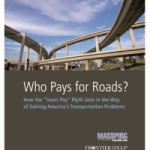Who Pays For Roads?
How the ‘Users Pays’ Myth Gets in the Way of Solutions to America’s Transportation Problems
Many Americans believe that drivers pay the full cost of the roads they use through gas taxes and other user fees. That has never been true, and it is less true now than at any other point in modern times. Today, general taxes paid by all tax- payers cover nearly as much of the cost of building and maintaining highways as the gas tax and other fees paid by drivers.
Downloads
MASSPIRG Education Fund

New Report Finds Drivers Pay Less Than Half the Cost of Roads
Webinar to Explain Why Raising Gas Taxes Won’t Necessarily Solve Problems
As Congress struggles to renew the federal transportation law, a new report from MASSPIRG Education Fund, the Massachusetts Public Interest Research Group, and Frontier Group finds that drivers currently pay less than half the total cost of roads, and argues that while increasing gas taxes could fill the shortfall, it would leave other problems unaddressed.
The new report, Who Pays for Roads? How the ‘Users Pays’ Myth Gets in the Way of Solutions to America’s Transportation Problems exposes the widening gap between how Baystaters think we pay for transportation – through gas taxes and other fees – and how we actually do. The authors of the report will cohost a live webinar today at 1pm [EST] to explain the report findings and answer questions (click here to register and attend).
The new report comes with just a month left before expiration of the federal transportation act, and with the federal Highway Trust Fund on the brink of insolvency. Revenues from gas taxes and other user fees this year are expected to come up $16 billion short of the level needed to maintain current federal transportation spending, leading to the need for urgent congressional action.
“Congress is stuck in an endless loop,” said Kirstie Pecci, Staff Attorney at MASSPIRG “Either Congress will have to raise gas taxes to the high levels that would be needed to fully pay for the costs of highways or it will have to admit that the ‘users pay’ system no longer exists and needs to be reformed.”
“Congress faces important choices about transportation,” Pecci continued. “Playing make believe about where our transportation dollars come from shouldn’t be an option.”
The new report pulls back the veil on the “users pay” myth, finding that:
· Gas taxes and other fees paid by drivers now cover less than half of road construction and maintenance costs nationally – down from more than 70 percent in the 1960s – with the balance coming chiefly from income, sales and property taxes and other levies on general taxpayers.
· General taxpayers at all levels of government now subsidize highway construction and maintenance to the tune of $69 billion per year – an amount exceeding the expenditure of general tax funds to support transit, bicycling, walking and passenger rail combined.
· Regardless of how much they drive, the average American household bears an annual financial burden of more than $1,100 in taxes and indirect costs from driving – over and above any gas taxes or other fees they pay that are connected with driving.
“The ‘users pay’ myth is deeply ingrained in U.S. transportation policy, shaping how billions of dollars in transportation funds are raised and spent each year,” said Tony Dutzik, co-author of the report and Senior Analyst at Frontier Group, a non-profit think tank. “More and more, though, all of us are bearing the cost of transportation in our tax bills, regardless of how much we drive.”
Who Pays For Roads? also comes at a critical time for transportation funding in Massachusetts. Governor Baker’s MBTA Panel Report, issued on April 8, 2015 stated that the MBTA would be insolvent without significant funding from the Commonwealth. “Roads don’t pay for themselves, yet we expect transit systems to,” said Pecci, “The Governor’s proposal to lift the provision capping fare increases to 5% every two years is the first step in for calling for a significant fare increase. Here, as in the rest of the country, we are laboring under a double standard.”
State and federal policies often give priority to spending on highways based on the assumption that drivers pay the cost of roads through gas taxes and user fees. The report argues that, with the nation’s transportation needs changing and general taxpayers bearing an ever-greater share of the cost of transportation, America should instead invest transportation dollars in projects that are likely to deliver the greatest benefits.
Ordinary Americans agree. Nearly two-thirds of Americans believe it is appropriate to use gasoline tax revenue to support public transportation, according to a national study released last week by researchers at the Norman Mineta Transportation Institute. Other recent opinion polls suggest that Americans believe that the nation should give greater priority to transit, bicycling and walking in transportation spending.